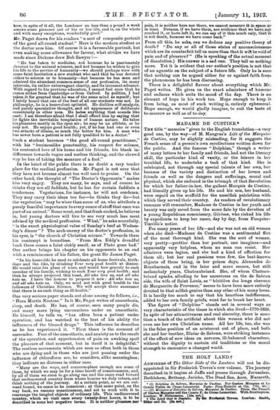MADAME DE CIJSTINE.*
THE title "memoirs "given to the English translationa very good one, by the way—of M. ktangras's Life of the Marquise- de Custine, may be elightly misleading, for it anggests the French sense of a person's own recollectiens written down for the public. .And the famous " Delphine," theugh a writer of many letters to her family and friends, had not the literary skill, the .particular kind of vanity, or the leisure in her troubled life, to undertake a task of that kind. She is- celebrated, not through any special talents of her own, but because- of the variety and distinction of her lovers and . friends as well as the dangers and sufferings, moral and physical, which she endured in the triumph of that Revolution for which her, father-in-law, the gallant Marquis de Custine, bad literally given up his life. He and his son, her husband, were repaid on the scaffold for the unselfish patriotism with which they served their country. As readers of revolutionary romance will remember, Madame de (Justine in her youth and beauty was only saved from the same fate. by the devotion of a young Republican commissary, Gerome, who risked his life by expedients to keep her name, day by day, from Fouquier- Tinville's notice.
For many years of her life—and she was not an old woman when she died—Madame de (Justine was a sentimental flirt of the most thorough kind. She was the sort of woman, very pretty--.prettier than, her portrait, one imagines—and apparently very helpless, whom no man can resist. Her admirers were legion, and she had a kind, of affection for theca all; but her real passions were few, the best-known objects of them being, in her prison days, Alexandre de- Beanharnais, and in the later and more secure, but still melancholy years,. Chateaubriand. She, of whom Chateau- briand speaks, alluding to her ancestress on the de Sabran side, the wife of Saint Louis, as " heritiere des longs cheveux de Marguerite de Provence," seems to have been more entirely devoted to that selfish genius than any other of his many loves. It is hardly too much to say that his heartless indifference, added to her own family griefs, went far to break her heart.
The figure of "Delphine" stands out in, several ways as very characteristic of the times in which she lived-1770-1826. In spite of her attractiveness and real sincerity, there is more than a touch of the artificial about this woman who did not even use her own Christian name. All her life, too, she was. in the false position of an, aristocrat out of place, and both she and ter brother, Elzear de Sabran, were striking instances. of the effect of new ideas on nervous, ill-balanced characters, without the dignity to sustain old traditions or the moral strength to encounter a changed world.










































 Previous page
Previous page